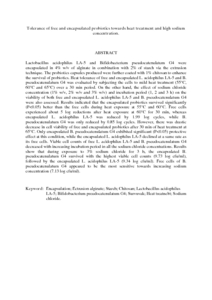Citation
Peck, Lian Teoh and Mirhosseini, Seyed Hamed and Mustafa, Shuhaimi and Abdul Manap, Mohd Yazid
(2011)
Tolerance of free and encapsulated probiotics towards heat treatment and high sodium concentration.
Journal of Food, Agriculture and Environment, 9 (1).
pp. 69-73.
ISSN 1459-0255
Abstract
Lactobacillus acidophilus LA-5 and Bifidobacterium pseudocatenulatum G4 were encapsulated in 4% w/v of alginate in combination with 2% of starch via the extrusion technique. The probiotics capsules produced were further coated with 1% chitosan to enhance the survival of probiotics. Heat tolerance of free and encapsulated L. acidophilus LA-5 and B. pseudocatenulatum G4 was evaluated by subjecting the cells to mild heat treatment (55°C, 60°C and 65°C) over a 30 min period. On the other hand, the effect of sodium chloride concentration (1% w/v, 2% w/v and 3% w/v) and incubation period (1, 2 and 3 h) on the viability of both free and encapsulated L. acidophilus LA-5 and B. pseudocatenulatum G4 were also assessed. Results indicated that the encapsulated probiotics survived significantly (P<0.05) better than the free cells during heat exposure at 55°C and 60°C. Free cells experienced about 5 log reductions after heat exposure at 60°C for 30 min, whereas encapsulated L. acidophilus LA-5 was reduced by 1.99 log cycles, while B. pseudocatenulatum G4 was only reduced by 0.85 log cycles. However, there was drastic decrease in cell viability of free and encapsulated probiotics after 30 min of heat treatment at 65°C. Only encapsulated B. pseudocatenulatum G4 exhibited significant (P<0.05) protective effect at this condition, while the encapsulated L. acidophilus LA-5 declined at a same rate as its free cells. Viable cell counts of free L. acidophilus LA-5 and B. pseudocatenulatum G4 decreased with increasing incubation period in all the sodium chloride concentrations. Results show that during exposure to 3% sodium chloride for 3 h, the encapsulated B. pseudocatenulatum G4 survived with the highest viable cell counts (9.73 log cfu/ml), followed by the encapsulated L. acidophilus LA-5 (9.34 log cfu/ml). Free cells of B. pseudocatenulatum G4 appeared to be the most sensitive towards increasing sodium concentration (7.13 log cfu/ml).
Download File
![[img]](http://psasir.upm.edu.my/17430/1.hassmallThumbnailVersion/Tolerance%20of%20free%20and%20encapsulated%20probiotics%20towards%20heat%20treatment%20and%20high%20sodium%20concentration.pdf)  Preview |
|
PDF (Abstract)
Tolerance of free and encapsulated probiotics towards heat treatment and high sodium concentration.pdf
Download (84kB)
| Preview
|
|
Additional Metadata
Actions (login required)
 |
View Item |

